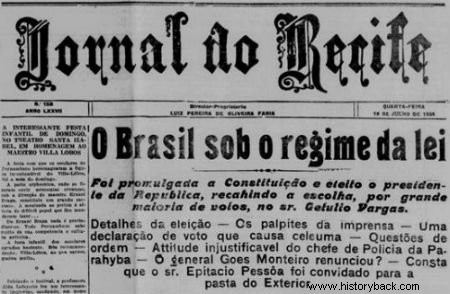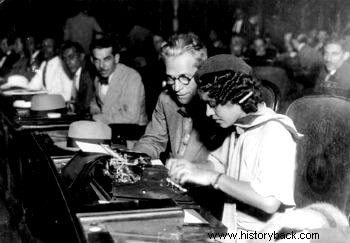The Constitution of 1934 it was the 3rd Brazilian Constitution and the 2nd of the Republic.
The Magna Carta brought novelties such as the institution of the female vote and Popular Action.

"Jornal do Recife" celebrates the promulgation of the new Constitution and the new government on July 18, 1934
Historical Context
Brazil was going through significant political changes in the 1930s.
Getúlio Vargas and his allies had managed to overthrow President Washington Luís and a Military Junta established a Provisional Government.
In this period, the Constitution of 1891 ceased to be in force and, in its place, Decree 19.380/30 was made, which determined:
- The end of governors policy;
- The disarmament of the colonels;
- The dissolution of the National Congress, Legislative Assemblies and Municipal Chambers;
- The Provisional Government would exercise the Legislative and Executive Powers;
- The President of the Republic would govern by decree.
These measures were supposed to have a transitory character, but Getúlio Vargas made no move to change this situation.
Thus, the state of São Paulo launched the Revolution of 1932 with the aim of overthrowing the government and giving the country a Constitution.
Although the Paulistas were defeated, Vargas could no longer postpone the convening of a Legislative Assembly if he wanted to remain in power. Therefore, he calls legislative elections and inaugurates the work for the elaboration of the new Constitution.
Read more:
- Washington Luis
- Revolution of 1930
- Revolution of 1932
- Governors Policy
Characteristics of the 1934 Constitution
- Federative Republic as a form of government;
- United States of Brazil;
- Incorporated the female vote;
- Determines that electoral suffrage be universal, secret, direct and by majority vote;
- Established free and compulsory primary education;
- The Chamber of Deputies was directly elected, but there were also representatives elected by professional organizations;
- The Executive Power was exercised by the President of the Republic for a term of four years and without the right to reelection;
- Established the Electoral Court and the Labor Court;
- Foresaw the Writ of Mandamus;
- Instituted Popular Action.

Almerinda Farias Gama, deputy elected as representative of the Typist and Shorthand Typist Union and the Federal District Labor Federation
Curiosity
The 1934 Constitution was the shortest in the history of Brazil:just three years.
Check and download the 1934 Constitution in PDF.
Read more :
- Provisional Government
- Era Vargas
- Female Vote in Brazil
- Brazilian Constitutions
- Brazilian Integralist Action
- Exercises on the Vargas Era
